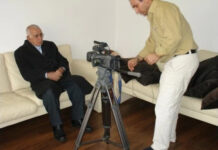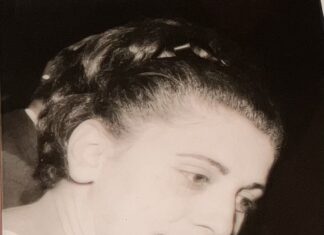NEW YORK — More than 200 parishioners and friends gathered in Haik and Alice Kavookjian Auditorium on Sunday, September 15 to celebrate the 45th anniversary of the consecration of St. Vartan Cathedral.
The event took place following the celebration of the badarak by the Primate of the Diocese of the Armenian Church of America (Eastern), Archbishop Kahajag Barsamian on the Feast of the Exaltation of the Holy Cross. The names of more than 150 departed St. Vartan godfathers and Cathedral Project committee members were read in a special requiem service during the services.
In his homily, the Primate recounted the spiritual importance and symbolism of the cathedral — not only for the Armenian community, also for Americans who have come to pray and light candles throughout countless occasions. He especially singled out the tragic day of September 11, 2001, when hundreds of people entered the sanctuary to find solace and comfort in the wake of the terrorist attack on New York.
The Primate also expressed great appreciation to the Catholicos of All Armenians Karekin II for his gift to the Eastern Diocese of the 1,500-year-old relic of St. Vartan the Brave, in honor of this 45th anniversary. The relic, a piece of stone encrusted with the blood of St. Vartan, is encased in a hand-crafted silver cross, which was sanctified in Echmiadzin in a special ceremony in late August, and brought to St. Vartan Cathedral. It was unveiled for the first time on Sunday in a procession led by members of the Knights of Vartan.
Opening the luncheon and program in Kavookjian Hall, Archbishop Yeghishe Gizirian gave the invocation after which Commemoration Committee co-chair Paul Zakian offered a toast to “all who sacrificed for this sacred place.”
Mistress of Ceremonies Arpine Barseghian, a medical student, speaking in English and Armenian, introduced the keynote speaker: Mark Movsesian, professor of Law at St. John’s University and an authority on the nexus of law and religion.
In an inspiring address, Movsesian related that this cathedral which was consecrated by the late Catholicos of All Armenians Vasken I “required vision, skill and courage, and has been part of the fabric of this city.” Modeled in part on the ancient St. Hripsime Church in Armenia, it is not only a “monument to antiquity, but a living spiritual and cultural center.”
He recounted many milestones that have taken place in the cathedral, including the liturgical celebrations, events for young people, families, and the elderly, musical performances, art exhibitions, spiritual and educational workshops and ecumenical gatherings.
Dedicated to Vartan the Brave whom, in preserving Christianity for Armenia, achieved a “moral victory,” the history of St. Vartan “resonates with the concept of religious liberty that is so fundamental to American culture-the arguments of waves of immigrants who came here,” he continued. “Many of these immigrants came so that they could worship God free from state compulsion.”
The story of Avarayr is one of “blood and sacrifice, of martyrdom and survival, emblematic of our history as a Christian people from the beginning,” he said. The Genocide survivors were the founders of this cathedral, Movsesian noted, and “associated this new American cathedral with the message of survival and rebirth.” Many have since come having survived persecution in Azerbaijan in the 1980s; and even the Copts who also have suffered persecution, conduct services here, he related.
The name of St. Vartan is a reminder that in other parts of the world, especially in Syria today, Armenians “continue to pay a price for their faith,” Movsesian declared. “We must do what we can to help our brothers and sisters who are persecuted for their religion – our religion-and welcome them as our ancestors did. May the cathedral be a symbol of hope for them.”
To the delight of the audience, St. Vartan Armenian School students Erik Assatryan, Valentina Assatryan, Marar Makarian, Ariana Pamoukian and Jano Tokatiyan recited several beloved Armenian poems in clear and proud voices.
Violinist Sami Mardinian and pianist Riko Higuma offered selections from Komitas, Khachaturian and Edgar Baghdasarian.
A video presentation was shown outlining the cathedral building’s history and consecration, produced by Artur Petrosyan and narrated by the Diocesan Communications Director Chris Zakian.
Armenia’s Ambassador to the United Nations Garen Nazarian stated that for Armenians who live outside of Armenia, the cathedral is “a piece of the homeland. It is not only a peaceful sanctuary, but also embodies the strength of our faith, our spiritual and cultural heritage, and symbolizes the memory of our history and our reconstructed identity.” He recalled how during the late 1980s and early 1990s, with Armenia struggling after the devastating earthquake, war, blockades and a depressed economy, St. Vartan Cathedral and the diocese served as a launching point for many of the relief efforts to support the “vital programs” in Armenia and Karabagh.
The mission of the church today, the ambassador continued, is “revival and renewal of our religion and social lives. The Armenian Apostolic Church has always been, is, and will be our solid pillar of faith and love towards each other, and towards the homeland.”
Closing the evening, Barsamian recalled the “I Have a Dream” speech of the Rev. Martin Luther King Jr. “This dream became a reality for us in this country of equality and opportunity. The dream of the Armenian immigrants — 60, 70, 80 years ago — became a reality. Here, we welcomed the first ambassador of a free Armenia, and here we now see the young people reciting in Armenian.”
That was the dream of those who built this cathedral, and “we express our deep appreciation to them. The dream now is to see that the younger generation feels proud of their identity,” the Primate stated. “It’s our mission to keep the dream alive now and in the future.” Expressing appreciation to the members of the Commemoration Committee, and to Nazarian who “represents for us the strength of our country,” the Primate declared, “May the ties between Armenia and the diaspora always and forever grow stronger.”
The closing prayer by Gizirian, and the singing of the Hayr Mer by all present closed a day of reflection and gratitude.
The Commemoration Committee was under the auspices of the Primate and under the direction of the Cathedral Dean, Rev. Mamigon Kiledjian. Committee members included Paul and Berta Zakian, co-chairs; Araks Yeramyan Andrews, Talene Baroyan, Sona Haratunian, Dr. Kevork Niksarli, Shoghik Oganesyan, Avedis Ohannessian and Vartges Saroyan.









